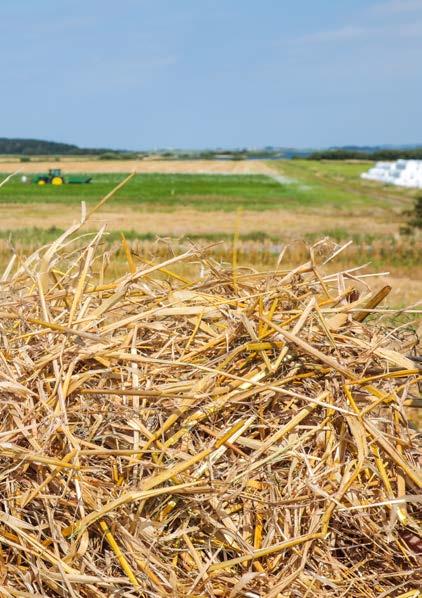Guidelines for Sustainable Business Practice


Adopted by FELLESKJØPET ROGALAND AGDER’s board of directors on 24 September 2020
INTRODUCTION
FELLESKJØPET ROGALAND AGDER strives to operate its business in a sustainable way, which respects people, society and the environment. This document, including the organisation’s principles for sustainable business practice, underpins our sustainability efforts.

FELLESKJØPET ROGALAND AGDER considers sustainable business practice to be a precondition for sustainable development. This means meeting the needs of the present without compromising the ability of future generations to meet their own needs.1 The United Nations Sustainable Development Goals (SDGs) form a global action plan for sustainable development. FELLESKJØPET ROGALAND AGDER is working actively in support of the SDGs.
As a member of Norway’s Ethical Trading Initiative, FELLESKJØPET ROGALAND AGDER pledges to develop and perform due diligence assessments to guide its sustainable business practice.2 Due diligence assessments are a risk-based approach to respecting and protecting people, society and the environment both in our own operations and throughout the supply chain. We expect our suppliers and partners to take the same approach.
1 Brundtland Commission “Our Common Future”, 1987 2 UN OHCHR, “Guiding Principles on Business and Human Rights (UNGP)”, 2011; OECD, “Due Diligence Guidance for Responsible Business Conduct”, 2018STANDARDS REQUIRED IN OUR OWN OPERATIONS
FELLESKJØPET ROGALAND AGDER acknowledges that our business practices could have a negative impact on people, society and the environment. At the same time, we recognise the potential we have to contribute to positive developments in our supply chain. On this basis, we have drawn up the following principles and standards for our own operations:
Due diligence assessments
FELLESKJØPET ROGALAND AGDER shall perform due diligence assessments to guide its sustainable business practices. In other words, identify where we are at risk of having a negative impact on people, society and the environment, and halt, reduce and prevent any such impact. Measures implemented will be monitored and their effect analysed and communicated to those concerned. Where our activities cause or contribute to a negative impact on people, society or the environment, we will halt the activity in question and will attempt to remedy the harm caused. Where a supplier is responsible for the negative impact/harm, the supplier is also responsible for its remediation.3
Responsible procurement
FELLESKJØPET ROGALAND AGDER considers responsible procurement to be one of the most important tools in our efforts to operate sustainably. FELLESKJØPET ROGALAND AGDER shall adjust its procurement practices to strengthen, and not undermine, our suppliers’ ability to meet the standards we set to ensure good conditions for people, society and the environment. We shall strive to establish longterm relationships with suppliers who show a particular willingness and ability to work for improvements in the supply chain.
3 OECD’s National Contact Point for Responsible Business Contact, “OECD Due Diligence Guidance for Responsible Business Conduct – an introduction”, 2018.Freedom to unionise and employee representation
FELLESKJØPET ROGALAND AGDER supports the right to freely join or form a trade union, as well as other types of democratically elected employee representation. We shall involve employee representatives and other relevant stakeholders in our efforts to operate sustainably.
Supplier development and partnerships
In consultation with suppliers, we will, if necessary, consider offering assistance to raise their level of competence or provide other resources that enable suppliers to meet the standards FELLESKJØPET ROGALAND AGDER sets for its supply chain. In this way, we will pave the way for good cooperation with suppliers who show a particular willingness and ability to work for the positive development of people, society and the environment within the supply chain.
Anti-corruption
FELLESKJØPET ROGALAND AGDER, including all its employees, shall never offer or accept illegal or unlawful gifts of money or other remunerations to obtain commercial or personal benefits for themselves or for customers, agents or suppliers.
Countries subject to international trade embargoes
FELLESKJØPET ROGALAND AGDER, including our suppliers and business partners, shall avoid trading partners who have activities in countries that are subject to an international trade embargo imposed by the UN and/or the Norwegian government.
STANDARDS REQUIRED IN THE SUPPLY CHAIN
We expect our suppliers and business partners to work methodically and systematically to comply with these standards, including our principles for sustainable business practice, which cover fundamental requirements with respect to human and labour rights, anti-corruption, animal welfare and the environment. Together, they constitute our Supplier Code of Conduct. Our suppliers shall:
• Comply with our Supplier Code of Conduct, including our principles for sustainable business practice.
• Work actively to perform due diligence assessments, i.e. perform their own assessments of the risk of having a negative impact on people, society and the environment, and halt, reduce and prevent any such im pact. Any measures implemented must be monitored, their effect ana lysed and communicated to those concerned. Where the supplier is responsible for any negative impact/harm, the supplier is also responsi ble for its remediation.4
• Show a willingness and ability to strive for continuous improvement for people, society and the environment through cooperation.
• Document, at the request of FELLESKJØPET ROGALAND AGDER, how they themselves, and any subcontractors they may have, are working to comply with the Supplier Code of Conduct.
If the supplier, after repeated requests, does not show a willingness or ability to comply with the Supplier Code of Conduct, their contract may be terminated.
4 OECD’s National Contact Point for Responsible Business Contact, “OECD Due Diligence Guidance for Responsible Business Conduct – an introduction”, 2018.PRINCIPLES FOR SUSTAINABLE BUSINESS PRACTICE (CODE OF CONDUCT)
These principles for sustainable business practice are based on UN and ILO conventions and constitute a minimum – not a maximum – standard. All laws in effect where production takes place must be respected. Where national laws and regulations cover the same topics as these principles, the highest standard shall prevail.
1. Forced labour/slave labour (ILO conventions 29 and 105)
1.1. No form of forced labour, slave labour or involuntary labour must take place.
1.2. Workers must not be obliged to pay a deposit or surrender their identity papers to their employer, and must be able to freely terminate the employment relationship at a reasonable period of notice.
2. Unionisation and collective bargaining (ILO conventions 87,
98, 135 and 154)
2.1. Workers shall, without exception, be entitled to join or form a trade union if they so wish, and to negotiate collectively. The employer shall not interfere with, prevent or work against unionisation or collective bargaining.
2.2. Trade union representatives shall not be discriminated against or prevented from performing union-related activities.
2.3. If the right to unionisation and/or free collective bargaining is restricted by law, the employer shall facilitate – and not hinder – alternative mechanisms for free and independent organisation and negotiation.
3. Child labour (UN Convention on the Rights of the Child, ILO conventions 138, 182 and 79, ILO recommendation 146)
3.1. Workers must not be less than 15 years of age, and otherwise comply with the national minimum age for employment, or have reached the minimum schoolleaving age, whichever is the highest. If the local minimum age for employment is set at 14 years, in line with the exception from ILO convention 138, this may be accepted.
3.2. The new recruitment of child labourers in contravention of the abovementioned minimum ages shall not take place.
3.3. Children under the age of 18 shall not perform work that is detrimental to their health, safety or moral welfare, including night work.
3.4. Action plans shall be established for the rapid phasing out of child labour that contravenes ILO conventions 138 and 182. The action plans shall be documented and communicated to relevant personnel and other stakeholders. Support schemes shall be put in place to enable children to receive an education until they have passed the minimum school-leaving age.
4. Discrimination (ILO conventions 100 and 111 and the UN’s Convention on the Elimination of all Forms of Discrimination Against Women)
4.1. With respect to recruitment, salary, training, promotion, dismissal or pension entitlement, no discrimination shall take place on the grounds of ethnicity, caste, religion, age, disability, gender, civil status, sexual orientation, trade union activity or political affiliation.
4.2. Systems shall be established to protect against sexual harassment and abusive or exploitative behaviour, and against discrimination or unfair dismissal on the grounds of, for example, marriage, pregnancy, parenthood or HIVpositive health status.
5. Brutal treatment (Universal Declaration of Human Rights)
5.1. Physical abuse or punishment, and the threat of physical abuse are prohibited. The same applies to sexual or other types of abusive and degrading treatment.
6. Occupational health and safety (ILO convention 155 and recommendation 164)
6.1. Efforts shall be made to provide workers with a safe and healthy working environment. Hazardous chemicals and other substances must be handled in a safe manner. Necessary measures shall be implemented to prevent workplace accidents and minimise the harm to health caused by or related to working conditions.
6.2. Workers shall receive regular health and safety training. Such training must be documented. Health and safety training shall be given to new recruits and shall be repeated when workers are redeployed.
6.3. Workers shall have access to clean drinking water and sanitation. If relevant, the employer shall also ensure workers have access to facilities for the safe storage of food.
6.4. If the employer offers workers’ accommodation, this must be clean, safe, adequately ventilated and have access to clean drinking water and sanitation.
7. Wages (ILO convention 131)
7.1. Wages payable to workers for a normal working week must, at the very least, comply with national minimum wage provisions or industry standards, whichever is the higher. Wages shall always be sufficient to meet a person’s basic needs, including an element of saving.
7.2. Wage rates and the payment of wages must be agreed in writing before work commences. The agreement must be understandable to the worker.
7.3. The docking of wages as a disciplinary sanction is not permitted.
8. Working hours (ILO conventions 1 and 14)
8.1. Working hours must comply with national laws or industry standards, and may not exceed the working hours laid down in international conventions. A normal working week shall not usually exceed 48 hours.
8.2. Workers shall have at least one day off in every seven.
8.3. Overtime shall be limited and voluntary. The recommended maximum amount of overtime is 12 hours per week, i.e. a total maximum of 60 hours of work per week. Exceptions to this may be accepted if overtime is regulated by a collective agreement or national law.
8.4. Workers shall always be paid extra for hours worked in excess of normal working hours (see point 8.1 above). The rate at which such overtime is paid must, as a minimum, comply with prevailing legislation.
9. Regular employment
9.1. Employers shall not seek to circumvent their obligations to workers under international conventions, national laws and regulations relating to regular employment by means of short-term engagements (such as the use of temporary contract workers, casual or day labourers), subcontractors or other working relationships.
9.2. All workers are entitled to an employment contract in a language they understand.
9.3. Apprenticeship schemes shall be clearly defined with respect to their duration and content.
10. Marginalised groups
10.1. The production and exploitation of natural resources shall not harm the livelihoods and sources of income of indigenous peoples and other marginalised groups. This includes, for example, the commandeering of large tracts of land, the profligate use of water or the depletion of other natural resources that these population groups depend on.
11. Environment
11.1. Negative impact on the environment shall be reduced throughout the value chain. In line with the precautionary principle, measures shall be implemented to constantly minimise greenhouse gas emissions, local pollution and the use of harmful chemicals and pesticides. Efforts shall also be made to ensure the sustainable management and exploitation of marine, land, forest and water resources, and the preservation of biodiversity.
11.2. National and international environmental laws and regulations must be complied with and relevant emission permits obtained.
12. Corruption
12.1. All forms of bribery are unacceptable, as is the use of alternative channels to confer illegitimate personal or work-related benefits on customers, agents, contractors or suppliers. The same applies to their employees, as well as to public officials and employees.
13. Animal welfare
13.1. Animal welfare shall be respected. Measures should be implemented to minimise any negative impact on the welfare of livestock or working animals.
13.2. National and international animal welfare laws and regulations shall be complied with.
14. Food safety
14.1. Trade with developing countries is intended to contribute to positive economic development in the developing country and shall not, directly or indirectly, contribute to a weakening of the sustainable supply of food in that country. Our suppliers shall not export produce that can be used as food for human consumption from regions suffering from famine.
We have read and endorse “FELLESKJØPET ROGALAND AGDER`s Supplier Code of Conduct”
Supplier:

Date:
Signature:
Position:


